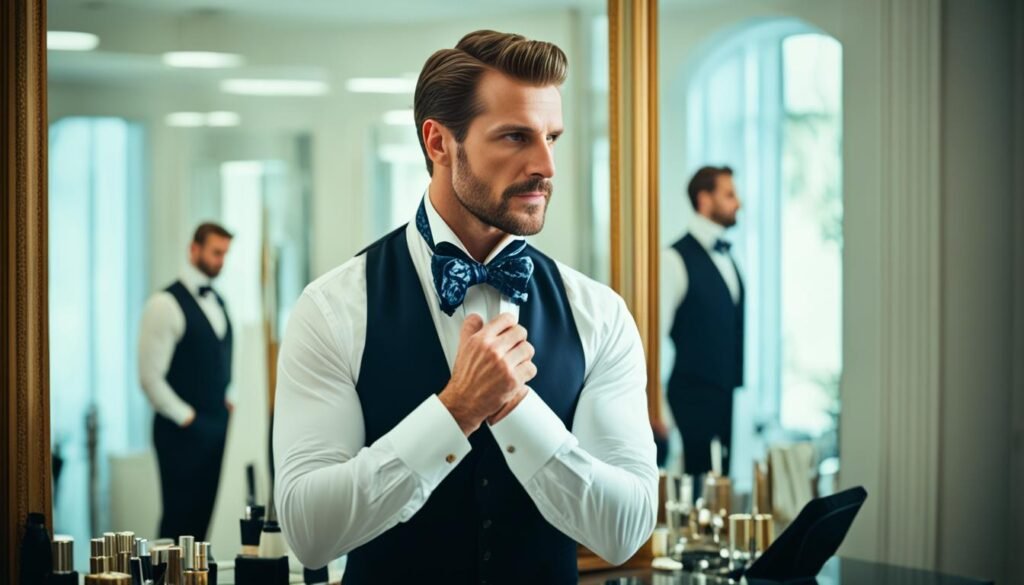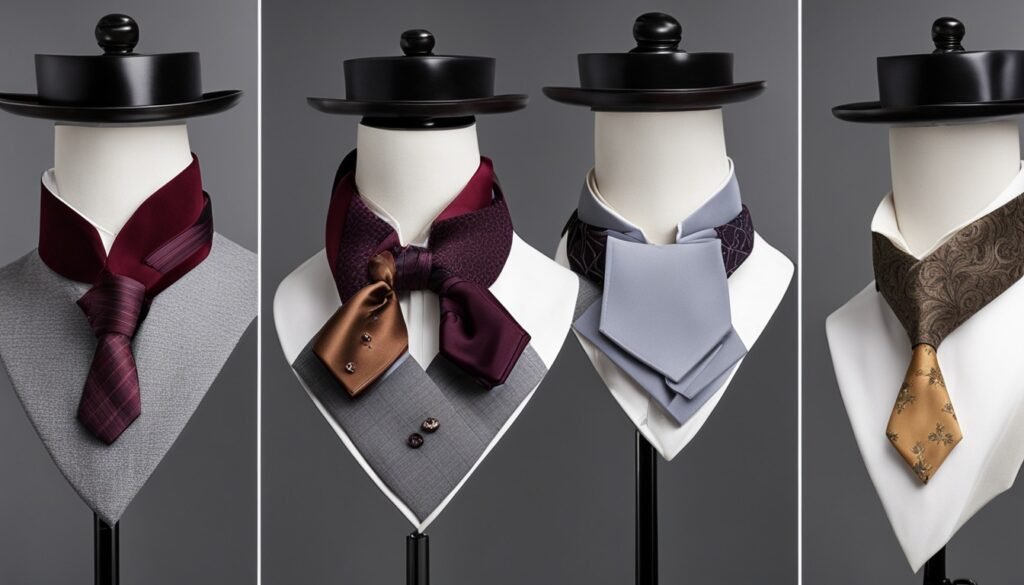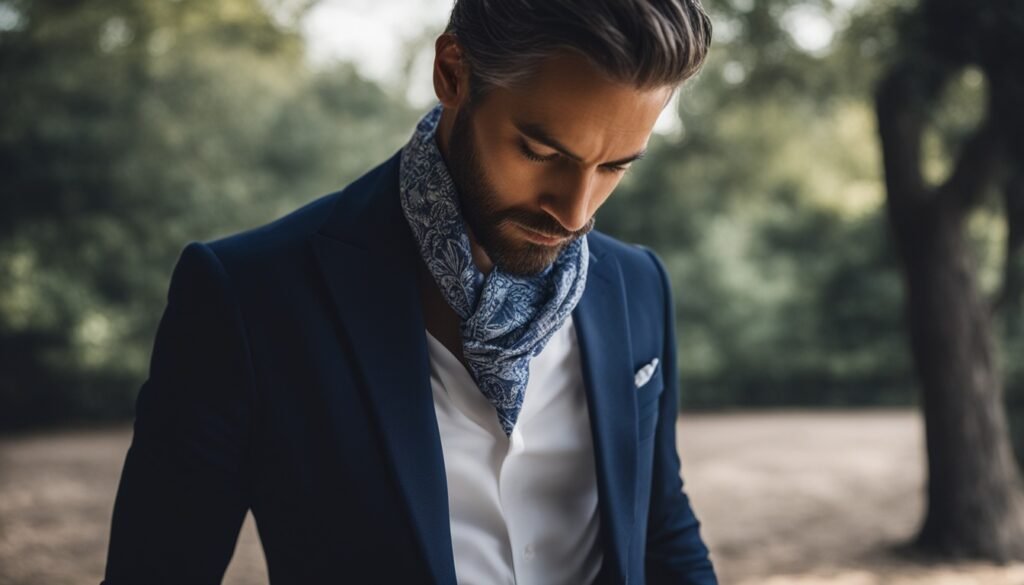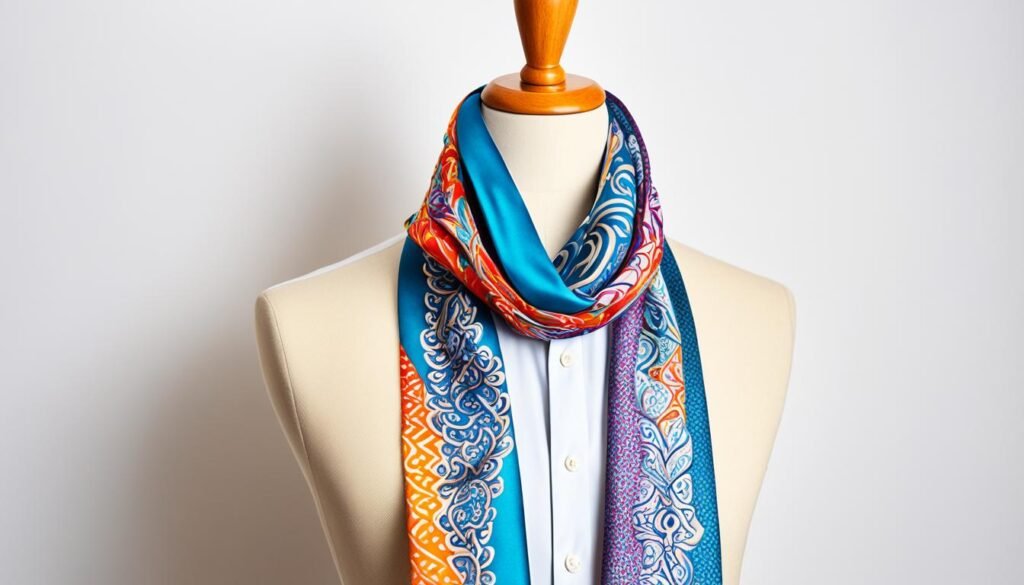
Did you know the cravat has been around since the 17th century? It started with Croatian military dress. Now, it’s a key piece of men’s fashion, showing off style and identity.
Cravats make formal outfits look better with their texture and design. They’ve changed with the times but still keep their important role. They’re perfect for weddings and fancy events, showing off elegance.
For more about this stylish accessory, check out this piece on men’s neckwear history.
Key Takeaways
- The cravat has been a part of men’s fashion since the 17th century, evolving in style and formality over time.
- Cravats are typically worn for formal occasions, whereas ascot ties are suitable for both formal and casual events.
- Materials such as silk and cotton are commonly used in crafting cravats, each providing distinct benefits.
- Cravats can be tied in various intricate styles, making them a versatile addition to any gentleman’s wardrobe.
- They serve not only as stylish neckwear but also as a reflection of social status and personal brand.
A Brief History of the Cravat
The history of cravat is fascinating, blending military and fashion. It shows how a simple item became a key part of men’s style. The cravat’s story tells us about changes in fashion and society over time.
The Origins of the Cravat
In the 17th century, Croatian soldiers wore a special necktie. This tie was both useful and stylish. French nobles soon took notice and made it a fashion must-have.
At first, the cravat was for soldiers. But it quickly became a key fashion piece for the upper class.
Evolution Through the Centuries
Over the years, the cravat changed a lot. By the 1660s, it was all about fancy lace and silk designs. Later, in the Regency era, the cravats became simpler but still very elegant.
Men wore cravats to look better and match their fancy coats. Today, the cravat is still loved for its mix of history and style. World Cravat Day, on October 18, celebrates its military roots and global impact.
| Period | Description |
|---|---|
| 17th Century | Introduction of the cravat by Croatian mercenaries to French aristocracy |
| 1660s | Initial fashion trends featuring elaborate lace cravats |
| Regency Era | Shift to silk cravats, emphasizing simplicity and sophistication |
| 19th Century | Cravat evolves into a simpler design, paving the way for the modern tie |
Cravat Styles to Consider
Cravats add elegance and versatility to men’s fashion. They range from the classic Ascot cravat to the easygoing pre-tied style. Each has its own charm that can enhance any outfit. Here are some top styles to consider for different events.
Ascot Cravat: The Height of Formality
The Ascot cravat is the top choice for formal events. It has wide, flat ends and a relaxed knot. Perfect for weddings and fancy parties, it’s made of silk for a luxurious feel.
Self-Tie Cravat: A Personal Touch
For those who want to stand out, the self-tie cravat is great. It comes in many materials and styles. You can try different knots, like the classic “four-in-hand.” Learning to tie it adds sophistication to any look.
Pre-Tied Cravat: Effortless Elegance
The pre-tied cravat is easy to wear and still looks stylish. It has a ready-made knot for a polished look with little effort. It’s perfect for anyone who wants to look good without much work.
Patterned Cravats for Visual Interest
Patterned cravats add a pop of color and style to an outfit. They come in many designs like stripes and paisleys. A bold cravat can make a classic outfit stand out, fitting many events.

| Cravat Style | Key Features | Ideal Occasions |
|---|---|---|
| Ascot Cravat | Wide ends, relaxed knot, luxurious fabric | Weddings, formal events |
| Self-Tie Cravat | Personalizable, various knots, fabric options | Formal, business, casual |
| Pre-Tied Cravat | Ready-made knot, quick to wear | Everyday wear, parties |
| Patterned Cravats | Variety of designs, versatile | Every occasion, stylish events |
For more tips on tying a cravat and looking sharp, check out this helpful resource.
How to Wear a Cravat
Learning how to wear a cravat can make your style stand out. It’s key to know how to tie it and match it with your clothes. Here are some steps to help you wear this elegant piece right.
Steps for Tying a Cravat
To get the perfect cravat look, follow these steps:
- Drape the cravat around your neck with one end longer than the other.
- Cross the ends to form a loop around your neck.
- Pull the longer end through the loop, adjusting for a neat appearance.
- Try different knots like the Mail Coach or Waterfall for variety.
These steps show you how to tie a cravat. You can then adjust it to fit your style.
Tips for Pairing with Outfits
Now you know how to tie a cravat, here are some tips for styling it with your clothes:
- Cravats look great with formal jackets and vests, giving you a polished look.
- Choose whether to wear the cravat under or over your collar to change your style.
- Think about the color and fabric of your cravat to match your outfit.
- Use cravats with both formal and casual clothes; they add style to a polo shirt.

Modern Cravat Styles
Modern cravat styles bring a new twist to old neckwear. They let men stand out with ease. By adding cravats to their daily look, men can boost their style with little effort. Designers now offer new takes on this classic accessory for today’s tastes.
Incorporating Cravats Into Everyday Wear
Adding cravats to everyday clothes is easier than you think. Men can easily mix cravats with different outfits for style and flexibility. Here are some ways to wear cravats:
- Layering with a blazer for a sharp look at business meetings.
- Wearing a cravat with a fitted shirt for a refined look at casual events.
- Choosing patterned day cravats to add fun to any outfit.
With neutral or bold colors, you can show off your personality. Modern cravat styles offer great versatility.
Designer Cravats: Elevating Your Look
Designer cravats are becoming popular. High-end brands offer luxurious options that boost your look. These designer pieces stand out with:
- Exquisite materials like silk for comfort and style.
- Unique designs and patterns for special events.
- They work for both formal and casual settings.
The modern ascot tie is a great example of designer elegance. It has a wide base and narrow ends, unlike the classic bow tie. Stars like David Beckham and George Clooney wear cravats, showing how they can upgrade your style.

| Type of Cravat | Material | Occasions | Style Tips |
|---|---|---|---|
| Ascot Tie | Silk | Formal events, weddings | Pair with a blazer or dress shirt for sophistication |
| Day Cravat | Silk & Cotton | Casual outings, business meetings | Bold patterns add flair to everyday wear |
| Wedding Cravat | Varies (silk preferred) | Weddings, formal receptions | Choose colors that match the bridal party |
| Wool Cravat | Wool | Winter events | Layer with outerwear for warmth and style |
Cravat Materials and Fabrics
Choosing the right cravat material is key for the look and feel you want. Different fabrics offer comfort, durability, and elegance. The right choice boosts your style and matches the event.
Choosing the Right Fabric for Your Cravat
The fabric you pick changes how your cravat looks and feels. Here are some top choices:
- Silk Cravats: Silk cravats shine and feel luxurious. They’re perfect for formal events, adding a touch of elegance.
- Cotton Cravats: Cotton cravats are versatile and comfy. They work well for daily wear, blending style with practicality.
- Other Fabrics: Linen and muslin were once favorites for casual styles. They add a vintage vibe.
Silk Cravats vs. Cotton Cravats
Let’s compare silk and cotton cravats:
| Feature | Silk Cravats | Cotton Cravats |
|---|---|---|
| Texture | Luxurious and smooth | Soft and breathable |
| Durability | Less durable, may require delicate care | Highly durable, easy to maintain |
| Occasions | Formal events, weddings | Casual outings, everyday wear |
| Price Range | Generally higher | Affordable options available |
Knowing these differences helps you pick the best cravat for any event. Choosing the right fabric is key to looking polished and stylish.

Understanding Cravat Accessories
Cravat accessories are key to making your look better and adding elegance. They bring interest to your outfit and let you express yourself. With the right accessories, you can make your cravat stand out.
Accessories That Complement Your Cravat
There are many accessories that can make cravats look better. Here are some examples:
- Collar Pins: These keep the cravat in place and add a touch of class.
- Brooches: Adding a brooch lets you show off your style with the cravat.
- Cravat Pins: These pins are important for keeping the fabric right and look great.
Some accessories are used more often with certain cravats. For example, cravat pins are often used with silk cravats to make them look more luxurious.
Historical Significance of Cravat Accessories
In the past, cravat accessories were very important in men’s fashion. Stocks and jabots showed how refined a person was. Knowing about these accessories helps us understand fashion’s evolution and adds to today’s styles. Silk cravats are still very popular, showing their long history in men’s fashion.

| Accessory Type | Use Frequency | Market Popularity (%) |
|---|---|---|
| Collar Pins | High | 45 |
| Brooches | Medium | 30 |
| Cravat Pins | High | 60 |
| Stocks | Low | 15 |
| Jabots | Medium | 25 |
Looking at the history of cravat accessories helps us appreciate today’s styles more. By using these accessories wisely, you can mix old-time elegance with modern style.
Caring for Your Cravat
Caring for cravats keeps them looking elegant and lasting longer. Whether you have a silk or polyester cravat, knowing how to take care of it is key. This will help your accessories stay in top shape.
How to Clean and Maintain Your Cravat
When cleaning cravats, the type of fabric is important. Silk cravats should be dry cleaned. This is because professional cleaners use gentle solvents that keep the silk safe. For small stains, you can wash them by hand in lukewarm water with a mild detergent. But, don’t use a washing machine. The heat and spin can harm the delicate fibers.
- Dry clean silk cravats to maintain condition.
- Hand wash with tepid water for minor stains.
- Keep silk away from zippers and sharp objects to prevent snags.
- Iron lightly with low heat using a fabric cloth to remove creases.
Storage Tips for Longevity
Storing cravats right can make them last longer. Keep silk cravats out of direct sunlight to stop them from fading. Use cravat racks or keep them in wardrobes to keep them smooth. A cool, dry place is best for keeping silk accessories looking great for years.
- Store cravats away from direct sunlight.
- Use cravat racks or wardrobes for optimal storage.
- Ensure a cool, dry space to prolong accessory life.
| Cleaning Method | Material | Recommended for? |
|---|---|---|
| Dry Cleaning | Silk | Maintaining condition |
| Hand Wash | Silk | Minor stains |
| Machine Wash | Polyester | Durable wear |
Vintage Cravats: A Timeless Appeal
Vintage cravats have a special charm. They show off the elegance of past times. Looking into their history, we see how fashion has changed from the 17th century to today. Each style tells its own story, making vintage cravats a great find for anyone’s closet.
Exploring Historical Styles of Cravats
Cravats started during the Thirty Years’ War with Croatian soldiers. They have changed a lot since then. In the 18th century, they were narrow and practical. By the 19th century, they were more decorative and showed off wealth.
These pieces were made with fancy materials like silk and had beautiful embroidery. They were not just fashion items but also showed a person’s status. Today, vintage cravats are loved for their history and beauty.
Modern designers are bringing back the cravat. Styles like the ascot tie are still popular today. They are perfect for both fancy and casual events.
Where to Find Vintage Cravats
If you’re looking for vintage cravats, there are many places to check out. Antique shops and estate sales often have unique pieces. Online sites like Etsy and eBay also have a wide selection.
Buying vintage cravats lets you own a piece of fashion history. They can make any outfit stand out. Plus, they’re great for starting conversations at parties.
| Era | Style | Materials | Key Features |
|---|---|---|---|
| 17th Century | Functional Cravat | Simple Fabrics | Narrow and practical |
| 18th Century | Fashionable Cravat | Silk, Lace | Long and intricate |
| 19th Century | Elaborate Cravat | Silk, Embroidered | Wider with embellishments |
| 20th Century | Modern Necktie | Various Fabrics | Streamlined and versatile |
The Role of the Cravat in Men’s Fashion
The cravat has been a key piece in men’s fashion for a long time. It’s more than just a cloth; it shows wealth, class, and social status. Over the years, it has changed with the times, showing how fashion and culture mix.
Cravat as an Indicator of Status
Since the 1600s, the cravat showed a man was wealthy. It was big in England, especially among the nobility. Its fancy materials and designs made it a sign of high class.
The English made it even more popular with their bright colors and patterns. This showed how men liked to make their cravats unique. By the 1820s, black cravats were for formal events, and bright ones for casual times.
Even when it wasn’t as popular, the cravat stayed classy. Stars like Brad Pitt and David Beckham wore it, making it cool again for today’s men.
Notable Figures and Their Cravat Styles
Many famous people have loved the cravat for its style and meaning. Beau Brummel, an early fan, showed how a well-tied cravat boosts your look and status. Today, stars like Pierce Brosnan and Michael Douglas still wear it, mixing old style with new fashion.
| Era | Cravat Style | Notable Wearers |
|---|---|---|
| 17th Century | Lace Cravat | Nobility |
| 19th Century | Starched Cravat | Beau Brummel |
| Modern Era | Designer Cravat | Brad Pitt, David Beckham |
The cravat still shows off style and uniqueness in men’s fashion. Its long history and link to status keep it popular with fashion-forward men. For more on the cravat’s cultural side, check out this article.
Conclusion
The cravat is a symbol of elegance and sophistication in men’s fashion. It has a long history, dating back to the 1600s with Croatian mercenaries. This stylish neckwear has become a timeless fashion statement.
Over the years, the cravat has changed with the times but kept its classic look. It’s now a key piece in modern wardrobes. Whether for a special event or daily wear, the cravat is more than just an accessory.
It shows off a man’s style and cultural taste. Resources like “The Art of Tying the Cravat” share its history and how to wear it. They cover everything from its history to easy-to-use pre-tied styles.
Cravats are getting more popular, especially in weddings for unique and personal looks. This shows the cravat’s lasting appeal in men’s fashion. Wearing a cravat not only adds to your style but also honors its rich history.
